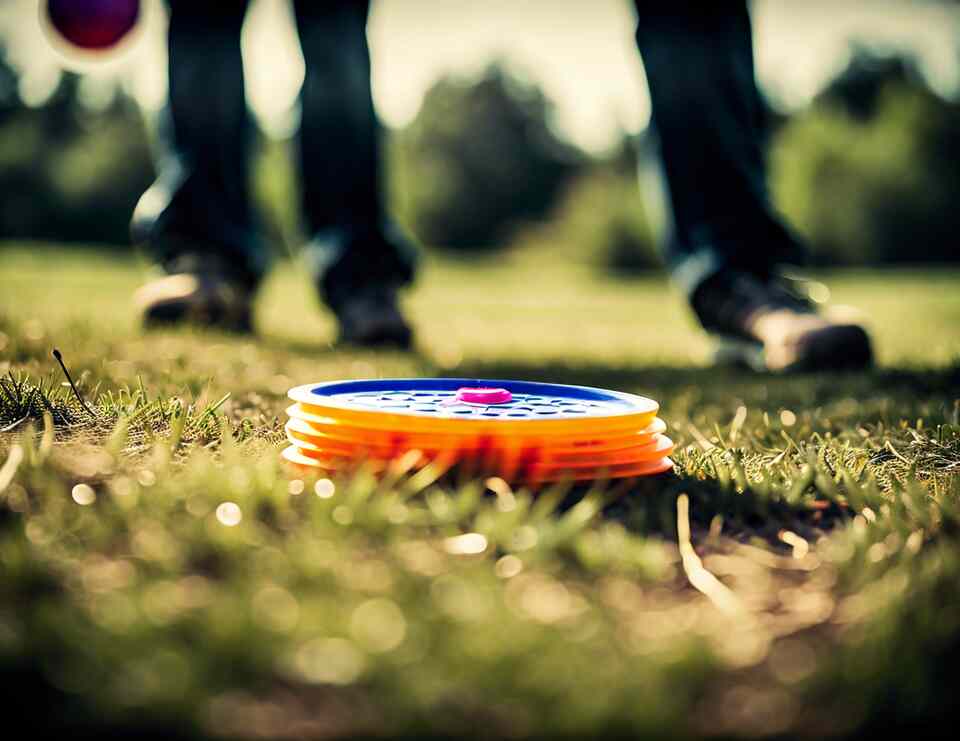Ever paused to wonder if disc golf is more than just a leisurely pastime? As I set out on the course, I couldn’t help but question its true fitness potential. What if this seemingly casual sport held the key to a full-body workout? Join me as we unravel the mystery behind disc golf’s surprising health benefits and discover how it transforms a simple game into a dynamic fitness regimen.
Key Takeaways:
- Physical Activity: Disc golf involves walking, throwing, and bending, providing a moderate cardiovascular workout.
- Outdoor Benefits: Spending time outdoors offers mental health benefits like stress reduction and improved mood.
- Low-Impact Activity: Unlike high-impact sports, disc golf is gentle on joints, making it suitable for all fitness levels.

Exploring the Health Benefits of Playing Disc Golf
When it comes to physical activities that combine fun and fitness, disc golf stands out as a fantastic option for people of all ages and skill levels. Disc golf, often referred to as Frisbee golf, is a sport that shares similarities with traditional golf, but instead of hitting a ball into a hole, players aim to throw a disc into a metal basket in as few throws as possible. This sport not only provides an enjoyable way to spend time outdoors but also offers a range of health benefits that contribute to overall well-being.
One of the primary health benefits of playing disc golf is the cardiovascular workout it provides. Walking from hole to hole, often through hilly or wooded terrains, helps increase heart rate and improves cardiovascular endurance. The repetitive motion of throwing discs also engages various muscle groups, including the arms, core, and legs, leading to enhanced strength and stamina over time.
Moreover, disc golf can be an excellent way to improve hand-eye coordination and balance. Requiring precision and accuracy in each throw, players develop better motor skills and spatial awareness through regular gameplay. This aspect of disc golf is particularly beneficial for children and individuals looking to enhance their coordination abilities in a dynamic and interactive setting.
In addition to the physical aspects, disc golf offers mental health benefits as well. The strategic nature of the game, where players must assess obstacles, wind conditions, and disc flight paths, promotes critical thinking and problem-solving skills. The focus required to aim and throw accurately also helps in increasing mindfulness and concentration, providing players with a mental workout that can reduce stress and anxiety.
Furthermore, the social aspect of disc golf should not be overlooked regarding its impact on overall well-being. Playing with friends, family, or fellow enthusiasts fosters social connections and a sense of community, leading to improved mood and a higher sense of belonging. The supportive and inclusive atmosphere of many disc golf courses encourages camaraderie and sportsmanship, further enhancing the overall experience for participants.
Disc golf is not only a fun and engaging sport but also a healthy activity that offers a holistic approach to well-being. By providing a blend of physical exercise, mental stimulation, and social interaction, disc golf enthusiasts can enjoy a comprehensive range of health benefits that contribute to a balanced and fulfilling lifestyle. So, grab your discs, head out to the nearest course, and experience the positive impact that disc golf can have on your overall health and wellness.
Physical Fitness Aspects in Disc Golf
Disc golf is not only a fun and engaging sport but also a great way to stay physically fit. Unlike traditional golf that requires players to walk long distances, disc golf involves walking shorter distances but with the added element of throwing a disc towards the target. This combination of walking, throwing, and sometimes running makes disc golf a comprehensive physical activity that offers several fitness benefits.
One of the key physical benefits of playing disc golf is improved cardiovascular health. Walking through the courses, often in natural settings like parks or forests, helps in increasing heart rate and overall cardiovascular endurance. Moreover, the act of throwing discs engages various muscle groups, including the arms, shoulders, back, and core, leading to improved strength and muscle tone.
Additionally, disc golf helps in enhancing flexibility and balance. The throwing motion in disc golf requires a significant range of motion in the arms and shoulders, thereby contributing to better flexibility. Players also need to maintain balance and stability while throwing discs, which helps in improving overall body coordination.
Another important aspect of physical fitness in disc golf is the calorie-burning potential it offers. While the exact number of calories burned during a round of disc golf may vary based on factors like course terrain and intensity of play, it is generally considered a moderate-intensity physical activity. Regularly playing disc golf can help in weight management and contribute to overall energy expenditure.
Furthermore, disc golf can be tailored to different fitness levels and ages, making it a versatile sport for individuals looking to start or maintain an active lifestyle. Whether you are a beginner or an experienced player, the physical demands of disc golf can be adjusted based on your preferences and fitness goals.
Disc golf is indeed a healthy sport that provides a unique blend of physical fitness benefits. From enhancing cardiovascular health and muscle strength to improving flexibility and balance, disc golf offers a well-rounded approach to staying fit and active. So, grab your discs, head to the nearest course, and enjoy a fulfilling workout while having fun on the disc golf course.
Exploring the Health Benefits of Playing Disc Golf
Disc golf is a sport that offers a wide range of health benefits for both the body and the mind. One of the primary advantages of playing disc golf is the level of physical activity it involves. Unlike traditional golf, disc golf requires players to walk long distances across varying terrain to complete each hole. This constant movement helps improve cardiovascular health, strengthens muscles, and enhances overall physical fitness.
In addition to the physical aspects, disc golf also contributes to mental well-being and stress relief. The serene and natural settings of many disc golf courses create a peaceful environment that can help alleviate anxiety and reduce stress levels. The concentration and focus required to accurately throw the disc towards the target also serve as a form of mindfulness, promoting mental clarity and relaxation.
Furthermore, disc golf is a sport that can be enjoyed by people of all ages and fitness levels. Whether you are a beginner or an experienced player, disc golf offers a low-impact form of exercise that can be easily tailored to individual needs and abilities. This inclusivity makes it a great option for those looking to improve their physical health without the risk of overexertion or injury.
When it comes to nutritional considerations for disc golfers, it is important to fuel your body with the right foods to support optimal performance on the course. Eating a balanced diet that includes a variety of fruits, vegetables, lean proteins, and whole grains can provide the energy and nutrients needed to sustain long rounds of disc golf. Staying hydrated is also crucial, especially on hot days or when playing multiple rounds in a row.
To prevent injuries while playing disc golf, it is essential to practice proper throwing techniques, warm up before each round, and listen to your body’s signals to avoid overuse injuries. In the event of an injury, implementing effective recovery strategies such as rest, ice, compression, and elevation can help speed up the healing process and get you back on the course in no time.
Disc golf is not only a fun and engaging sport but also a healthy one that offers a multitude of benefits for both the body and the mind. By incorporating disc golf into your fitness routine and paying attention to your physical and mental well-being, you can enjoy all that this sport has to offer while maintaining a healthy and active lifestyle.
Exploring Nutritional Considerations for Disc Golfers
When it comes to disc golf, nutrition plays a vital role in enhancing performance, stamina, and overall well-being. Disc golf is a sport that requires physical endurance, mental focus, and agility – all of which can be influenced by what and how players fuel their bodies. Proper nutrition can not only improve your game on the disc golf course but also contribute to your overall health and longevity as an athlete.
One key aspect of nutrition for disc golfers is hydration. Staying well-hydrated is essential for peak performance on the course. Dehydration can lead to fatigue, muscle cramps, and decreased concentration – all of which can significantly impact your game. It’s recommended to drink water regularly before, during, and after your rounds to ensure you stay hydrated and maintain optimal performance.
In addition to hydration, maintaining a balanced diet is crucial for disc golfers. Consuming a variety of nutrient-dense foods such as fruits, vegetables, whole grains, lean proteins, and healthy fats can provide the energy and nutrients needed to sustain long hours on the course. Avoiding sugary snacks and processed foods is important to prevent energy crashes and promote sustained focus throughout your rounds.
Carbohydrates are particularly important for disc golfers as they provide a primary source of energy for muscle function. Including complex carbohydrates like whole grains, fruits, and legumes in your meals can help sustain energy levels and prevent fatigue during extended play. Protein is also essential for muscle repair and recovery, so incorporating lean sources such as chicken, fish, tofu, or beans into your diet can support optimal performance and aid in post-game recovery.
Furthermore, vitamins and minerals play a critical role in overall health and performance for disc golfers. Adequate intake of nutrients like vitamin C, vitamin D, calcium, and iron can help support immune function, bone health, and oxygen transport to muscles – all of which are important for competitive disc golf play. Consider incorporating a variety of colorful fruits and vegetables into your meals to ensure you’re getting a wide range of essential vitamins and minerals.
Paying attention to your nutrition as a disc golfer can have a significant impact on your performance, recovery, and overall well-being. By staying hydrated, maintaining a balanced diet rich in essential nutrients, and fueling your body with the right foods, you can optimize your game on the course and support your long-term success as a disc golfer. Remember, what you eat and drink off the course can be just as important as how you play on it.
Preventing Injuries and Enhancing Recovery in Disc Golf
When engaging in disc golf, players must stay mindful of potential injuries that can arise from repetitive motion, overexertion, or incorrect form. To prevent these common injuries, it is crucial for disc golfers to focus on proper warm-up techniques before hitting the course. dynamic stretches that target the shoulders, back, and legs can help improve flexibility and reduce the risk of strains or sprains.
Additionally, maintaining good form during throws is essential for injury prevention in disc golf. Players should pay attention to their posture, foot positioning, and follow-through to avoid putting unnecessary strain on their joints and muscles. Proper technique not only enhances performance but also minimizes the chances of experiencing long-term injuries.
Injuries are sometimes unavoidable, so understanding effective recovery strategies is equally important for disc golfers. Rest and allowing the body time to heal is crucial after sustaining an injury on the course. However, incorporating gentle stretching exercises or low-impact activities can help maintain mobility and prevent stiffness during the recovery process.
Moreover, incorporating cross-training activities can benefit disc golfers by strengthening different muscle groups and preventing overuse injuries. Activities such as yoga, swimming, or weight training can improve overall fitness levels and enhance performance on the disc golf course. By diversifying workouts, players can reduce the risk of repetitive strain injuries and improve their endurance during long rounds of disc golf.
It is also essential for disc golfers to listen to their bodies and not push through pain or discomfort. Ignoring warning signs from the body can lead to more severe injuries that may sideline players for an extended period. Understanding the difference between muscle soreness and acute pain is crucial in maintaining optimal performance and preventing serious injuries in disc golf.
Prioritizing injury prevention strategies and implementing effective recovery methods are vital components of a healthy and successful disc golf practice. By focusing on proper warm-up techniques, maintaining good form, incorporating cross-training activities, and listening to their bodies, disc golfers can enjoy the sport safely and sustainably for years to come.
Conclusion
Disc golf is undeniably a healthy sport that offers a wide range of physical, mental, and emotional benefits to its players. Through exploring the health benefits of playing disc golf, it becomes evident that this sport contributes significantly to overall well-being. The physical fitness aspects involved in disc golf, such as cardiovascular endurance, strength, flexibility, and balance, help players stay active and maintain a healthy lifestyle. Furthermore, engaging in disc golf can lead to improved mental well-being and stress relief, offering players a way to unwind, refocus, and boost their mood.
Nutritional considerations play a crucial role in supporting disc golfers’ performance and recovery. It is essential for players to fuel their bodies with nutritious foods that provide energy, support muscle growth and repair, and aid in overall health. By maintaining a well-balanced diet, disc golfers can optimize their performance on the course and enhance their overall health and well-being.
Moreover, injury prevention and recovery strategies are vital for disc golf players to sustain their physical health and continue enjoying the sport. Proper warm-up routines, stretching exercises, and cool-down practices can help reduce the risk of injuries and improve players’ flexibility and mobility. In the event of an injury, seeking appropriate medical attention, following rehabilitation guidelines, and allowing ample time for recovery are essential steps towards getting back on the course safely.
Disc golf offers a holistic approach to health and wellness, encompassing physical fitness, mental well-being, nutrition, and injury prevention strategies. By embracing the benefits of this sport and incorporating healthy practices into their lifestyle, disc golf players can experience a fulfilling and enriching journey both on and off the course. So, whether you are a seasoned disc golfer or a beginner looking to explore this exciting sport, remember that disc golf not only provides a fun and challenging experience but also serves as a pathway to a healthier and happier life.


